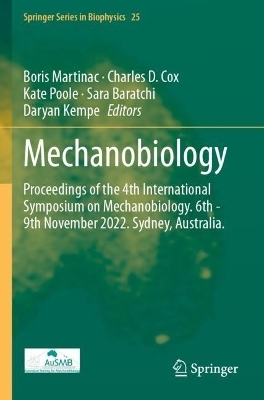
Mechanobiology
Springer International Publishing (Verlag)
978-3-031-45378-6 (ISBN)
The 4th International Symposium on Mechanobiology (ISMB) organized by the Australian Society for Mechanobiology (AuSMB) took place at the Sydney Nanoscience Hub at the University of Sydney, Australia, from the 6th to the 9th of November 2022.
This conference started in 2011 with the founding of the Society in Shanghai, China, and has occurred every three years also visiting Okayama (2014) and more recently Singapore (2017). This is the first time this conference was held in Australia.
The primary purpose of the 4th International Symposium on Mechanobiology (ISMB) was to act as a forum for dissemination of cutting-edge research and innovation in the field of mechanobiology. It brought together 200+ delegates from both the Australian and International communities (students, scientists, clinicians, engineers and stakeholders from academia, industry and other organisations) working in the broader field of mechanobiology to discuss new and exciting advances in the field. This collection reflects the diverse and multidisciplinary nature of mechanobiology research spanning length scales and organ systems.
Chapter 4 is available open access under a Creative Commons Attribution 4.0 International License via link.springer.com.
lt;b>Boris Martinac - Head of Mechanosensory Biophysics Laboratory at the Victor Chang Cardiac Research Institute - is an experimental biophysicist who is renowned for his discovery of mechanosensitive channels in bacteria and his pioneering contributions to the new field of mechanobiology. He majored in physics and received his PhD degree in biophysics from the RWTH Aachen University in Germany. He has published >200 peer-reviewed journal papers. Notably, the Nobel Prize Assembly recently highlighted Prof Martinac's ground-breaking work in proving the existence of mechanosensitive channels which led to the 2021 Nobel Prize for Physiology or Medicine. His contributions to the research in the mechanotransduction field have been recognised by numerous honours and awards, including election to the Fellowship of the Australian Academy of Science in 2013 as well as election to the Fellowship of the US Biophysical Society in 2023. At the Victor Chang Cardiac Research Institute his work expanded into studies of the role mechanosensitive ion channels play in cardiac health and disease.
Charles D. Cox - Head of the Cardiac Mechanobiology Laboratory at the Victor Chang Cardiac Research Institute - is a qualified pharmacist who practiced in both hospital and community settings (2008-2013) prior to joining the Victor Chang Cardiac Research Institute. He completed his PhD in 2013, following on from a Master's degree (Honours 1st class) in Pharmacy; both at Cardiff University, UK. Dr Cox's over-arching research interest is in understanding the molecular mechanisms and pathways by which physical forces are sensed by cells. In particular his research has contributed to understanding how ion channels sense and respond to these signals within the cardiovascular system and how they integrate mechanical signals in both health and disease. In 2015 Dr Cox was awarded the Young Biophysicist of the Year Award from the Australian Society of Biophysics and received a prestigious New South Wales Health EMCR Fellowship to support his work (2019-2021). Following this in 2022 Dr Cox was awarded an Australian Research Council Future Fellowship (2023-2026) and appointed as a laboratory Head of the Cardiac Mechanobiology Lab at the Victor Chang Cardiac Research Institute.
Kate Poole - Head of the Cellular Mechanotransduction laboratory at UNSW, is a physiologist and biophysicist studying the role of force sensing in human physiology. After a PhD in microbial biotechnology, awarded by the University of Adelaide, she joined the emerging field of research in mechanobiology. Her early work in the field contributed to the development of imaging and force-spectroscopy approaches using atomic force microscopy. Subsequently, her research has focused on the characterization and identification of mammalian mechanosensitive ion channels, particularly in touch transduction and in cancer. She was the first person awarded the Cecile Vogt Fellowship and has won multiple grants to support her mechanobiology research from funders in Australia, Germany, and the USA. She has a strong commitment to helping the development of young scientists as they begin their careers in research and dedicates a substantial proportion of her time to teaching both undergraduate and postgraduate students about aspects of biological force sensing, and its role in human health and disease.
Sara Baratchi - Alice Baker and Eleanor Shaw Gender Equity Fellow and Lab Head at the Baker Heart and Diabetes Research Institute is also an Associate Professor in the Baker Department of Cardiometabolic Health at the University of Melbourne. Her research is centered around pioneering artificial models of human blood vessels and heart valves, utilizing advanced microfabrication and microfluidic technologies. These models provide a platform for systematically elucidating the molecular mechanisms that regulate cellular responses to hemodyna
The conference will focus on topics that include:
|| Force Sensing Proteins |||| Mechanisms of Cellular Mechanotransduction- Ion Channels |||| Mechanisms of Cellular Mechanotransduction- The Cytoskeleton || || Tissue Mechanics |||| The Mechanobiology of Human Disease |||| Cardiovascular Mechanobiology |||| Mechanosensing in Plants |||| Bioengineering: Making Tools for Mechanobiology Research |||| Single-molecule Biophysics ||
| Erscheinungsdatum | 25.09.2024 |
|---|---|
| Reihe/Serie | Springer Series in Biophysics |
| Zusatzinfo | XV, 124 p. 1 illus. |
| Verlagsort | Cham |
| Sprache | englisch |
| Maße | 155 x 235 mm |
| Themenwelt | Naturwissenschaften ► Biologie ► Biochemie |
| Naturwissenschaften ► Biologie ► Mikrobiologie / Immunologie | |
| Naturwissenschaften ► Biologie ► Zellbiologie | |
| Naturwissenschaften ► Physik / Astronomie ► Angewandte Physik | |
| Schlagworte | Bioengineering • Cellular Mechanotransduction • Cytoskeleton • Force Sensing Proteins • ion channels • Single-Molecule Biophysics • Tissue Mechanics |
| ISBN-10 | 3-031-45378-6 / 3031453786 |
| ISBN-13 | 978-3-031-45378-6 / 9783031453786 |
| Zustand | Neuware |
| Informationen gemäß Produktsicherheitsverordnung (GPSR) | |
| Haben Sie eine Frage zum Produkt? |
aus dem Bereich


